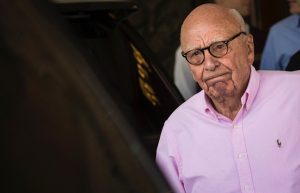Rupert Murdoch
Tuesday, April 5, 2022
April 5, 2022I often contemplate, particularly now, where our country would be without the influences of Rupert Murdoch and the state media he has created in the U.S. He began his residency in 1974 and became a U.S. citizen in 1985 after relinquishing his Australian citizenship, the legal requirement for US television network ownership. He established the FOX News Channel in 1996, the same year former president Bill Clinton signed the Telecommunications Act, overhauling 60 years of regulation. Murdoch thrived. And he is destroying us.
Astute and true:
New Zealand Prime Minister Jacinda Ardern said her country doesn’t have to deal with the “rage of older white men” because “we’ve never allowed Rupert Murdoch to set up a media outlet here.”
The veracity of the quote is being questioned. Regardless, he shouldn’t have been able to start his media empire here, and Clinton shouldn’t have sold us out. Cue Roger Ailes and Newt Gingrich and Rush Limbaugh. And here we are.
•DT
•Insurgency
•Plague
•Climate Crisis
•War
Our existential soup. Could we please hold off on adding any more ingredients? Maybe let this batch simmer for awhile.
Gen. Mark A. Milley on the Russian invasion of Ukraine: “We are witness to the greatest threat to peace and security in Europe – and perhaps the world – in my 42 years of service in uniform.”

Ukainian President Volodymyr Zelensky (C) speaks to the press in the town of Bucha, northwest of the Ukrainian capital Kyiv, on April 4, 2022. – Ukraine’s President Volodymyr Zelensky said on April 3, 2022 the Russian leadership was responsible for civilian killings in Bucha, outside Kyiv, where bodies were found lying in the street after the town was retaken by the Ukrainian army. (Photo by RONALDO SCHEMIDT / AFP)
Anne Baring, The Dream of the Cosmos-A Quest for the Soul:
p. 273
“Evil has its origin in this deeply unconscious predator-prey pattern of behavior. I think that, in relation to the harm we are capable of inflicting on the human beings, evil may be defined as the act of inflicting terror, suffering, humiliation, torture or yeah on an individual or group of individuals ranging in kind from the murder of a child to the atrocities currently taking place in Syria (2012) to the viciously cruel attacks on others on Facebook and Twitter. One of the most difficult things to recognize is that each one of us in capable of acting in a hateful cruel or evil way, or of being complicit in these ways of behaving, whether as an individual or as the member of a government, institution, corporate body or nation. […] The fact that an International Court of Justice now exists to try those who commit such crimes against human unity is evidence of collective progress in moral awareness. But this progress requires perpetual vigilance lest we slip back into old unconscious habits. [2013]
Ukrainian President Volodymyr Zelenskyy spoke to the United Nations Security Council today. Here is the link to watch his speech and listen to the statements by various countries after he spoke. There were technical issues with the video he wanted to share with the council, at about 1:15:00 into their remarks, the video was shown. We want to look away, we can not. Ever.
From The Hill:
‘If Russia is not removed from the council, Zelenskyy said the body should just be dissolved.
“If there is no alternative and no option, then the next option would be dissolve yourself altogether,” he said.
The Ukrainian president proposed a global conference to convene in Kyiv to discuss reforms to the United Nations.
“It is now clear that the goals set in San Francisco in 1945 for the creation of a global security international organization have not been achieved, and it is impossible to achieve them without reforms,” he said.’
“I don’t know where we fall in the legacy of life.”
-Sean PennWe crave leadership, and authenticity.
Matthew Fox, a spiritual theologian.
“Rabbi Heschel teaches that a prophet’s primary task is to interfere. Julian of Norwich, by calling us to interfere with patriarchy and heal the wounds that it has wracked upon human history and the human soul and the earth, beckons u from folly to wisdom. Are we listening?”
Fr Richard Rohr:
“Stage One people: At this level tend to be preoccupied with the pleasure, security, safety, and defense of their material state. And that extends to their morality: If it makes me feel secure, it is moral. Life is largely about protecting myself. This is seen in the endless need for war and guns, but little need for education culture, the arts, and spirituality. Stage One people are mostly dualistic, either/or thinkers, and frankly represent a rather sizable minority of humans. Their morality largely has to do with maintaining their group, and regarding their group as superior.”
Cancel Everything
March 11, 2020The Atlantic
Social distancing is the only way to stop the coronavirus. We must start immediately.
The first fact is that, at least in the initial stages, documented cases of COVID-19 seem to increase in exponential fashion. On the 23rd of January, China’s Hubei province, which contains the city of Wuhan, had 444 confirmed COVID-19 cases. A week later, by the 30th of January, it had 4,903 cases. Another week later, by the 6th of February, it had 22,112.
The same story is now playing out in other countries around the world. Italy had 62 identified cases of COVID-19 on the 22nd of February. It had 888 cases by the 29th of February, and 4,636 by the 6th of March.
Because the United States has been extremely sluggish in testing patients for the coronavirus, the official tally of 604 likely represents a fraction of the real caseload. But even if we take this number at face value, it suggests that we should prepare to have up to 10 times as many cases a week from today, and up to 100 times as many cases two weeks from today.
The second fact is that this disease is deadlier than the flu, to which the honestly ill-informed and the wantonly irresponsible insist on comparing it. Early guesstimates, made before data were widely available, suggested that the fatality rate for the coronavirus might wind up being about 1 percent. If that guess proves true, the coronavirus is 10 times as deadly as the flu.
But there is reason to fear that the fatality rate could be much higher. According to the World Health Organization, the current case fatality rate—a common measure of what portion of confirmed patients die from a particular disease—stands at 3.4 percent. This figure could be an overstatement, because mild cases of the disease are less likely to be diagnosed. Or it could be an understatement, because many patients have already been diagnosed with the virus but have not yet recovered (and may still die).
When the coronavirus first spread to South Korea, many observers pointed to the comparatively low death rates in the country to justify undue optimism. In countries with highly developed medical systems, they claimed, a smaller portion of patients would die. But while more than half of all diagnosed patients in China have now been cured, most South Korean patients are still in the throes of the disease. Of the 7,478 confirmed cases, only 118 have recovered; the low death rate may yet rise.
Meanwhile, the news from Italy, another country with a highly developed medical system, has so far been shockingly bad. In the affluent region of Lombardy, for example, there have been 7,375 confirmed cases of the virus as of Sunday. Of these patients, 622 had recovered, 366 had died, and the majority were still sick. Even under the highly implausible assumption that all of the still-sick make a full recovery, this would suggest a case fatality rate of 5 percent—significantly higher, not lower, than in China.
The third fact is that so far only one measure has been effective against the coronavirus: extreme social distancing.
Before China canceled all public gatherings, asked most citizens to self-quarantine, and sealed off the most heavily affected region, the virus was spreading in exponential fashion. Once the government imposed social distancing, the number of new cases leveled off; now, at least according to official statistics, every day brings more news of existing patients who are healed than of patients who are newly infected.
A few other countries have taken energetic steps to increase social distancing before the epidemic reached devastating proportions. In Singapore, for example, the government quickly canceled public events and installed medical stations to measure the body temperature of passersby while private companies handed out free hand sanitizer. As a result, the number of cases has grown much more slowly than in nearby countries.
These three facts imply a simple conclusion. The coronavirus could spread with frightening rapidity, overburdening our health-care system and claiming lives, until we adopt serious forms of social distancing.
This suggests that anyone in a position of power or authority, instead of downplaying the dangers of the coronavirus, should ask people to stay away from public places, cancel big gatherings, and restrict most forms of nonessential travel.
Given that most forms of social distancing will be useless if sick people cannot get treated—or afford to stay away from work when they are sick—the federal government should also take some additional steps to improve public health. It should take on the costs of medical treatment for the coronavirus, grant paid sick leave to stricken workers, promise not to deport undocumented immigrants who seek medical help, and invest in a rapid expansion of ICU facilities.
The past days suggest that this administration is unlikely to do these things well or quickly (although the administration signaled on Monday that it will seek relief for hourly workers, among other measures). Hence, the responsibility for social distancing now falls on decision makers at every level of society.
Do you head a sports team? Play your games in front of an empty stadium.
Are you organizing a conference? Postpone it until the fall.
Do you run a business? Tell your employees to work from home.
Are you the principal of a school or the president of a university? Move classes online before your students get sick and infect their frail relatives.
Are you running a presidential campaign? Cancel all rallies right now.
All of these decisions have real costs. Shutting down public schools in New York City, for example, would deprive tens of thousands of kids of urgently needed school meals. But the job of institutions and authorities is to mitigate those costs as much as humanly possible, not to use them as an excuse to put the public at risk of a deadly communicable disease.
Finally, the most important responsibility falls on each of us. It’s hard to change our own behavior while the administration and the leaders of other important institutions send the social cue that we should go on as normal. But we must change our behavior anyway. If you feel even a little sick, for the love of your neighbor and everyone’s grandpa, do not go to work.
When the influenza epidemic of 1918 infected a quarter of the U.S. population, killing tens of millions of people, seemingly small choices made the difference between life and death.
As the disease was spreading, Wilmer Krusen, Philadelphia’s health commissioner, allowed a huge parade to take place on September 28; some 200,000 people marched. In the following days and weeks, the bodies piled up in the city’s morgues. By the end of the season, 12,000 residents had died.
In St. Louis, a public-health commissioner named Max Starkloff decided to shut the city down. Ignoring the objections of influential businessmen, he closed the city’s schools, bars, cinemas, and sporting events. Thanks to his bold and unpopular actions, the per capita fatality rate in St. Louis was half that of Philadelphia. (In total, roughly 1,700 people died from influenza in St Louis.)
In the coming days, thousands of people across the country will face the choice between becoming a Wilmer Krusen or a Max Starkloff.
In the moment, it will seem easier to follow Krusen’s example. For a few days, while none of your peers are taking the same steps, moving classes online or canceling campaign events will seem profoundly odd. People are going to get angry. You will be ridiculed as an extremist or an alarmist. But it is still the right thing to do.
Rupert Murdoch could save lives by forcing Fox News to tell the truth about coronavirus — right now
By
There’s one person who could transform all that in an instant: Fox founder Rupert Murdoch, the Australian-born media mogul who, at 89, still exerts his influence on the leading cable network — and thus on the president himself.
Chris Wallace, the independent and tough-minded Fox News interviewer who serves as the network’s chief reality officer, has revealed that the executive chairman of News Corp and co-chairman of Fox Corporation likes to give feedback on what he sees on the network.
“He cares tremendously about the news,” Wallace said, according to the Guardian. “When I have contact with him, he never is asking about ideology, just: ‘What’s going on? What’s happening? Tell me.’ ”
That’s a little hard to believe, given the network’s long history of Clinton-bashing and birtherism lies about Barack Obama, and its peddling of conspiracy theories. But Murdoch’s ultimate power at the network is not in question.
So imagine if the word flowed down from on high that Fox News should communicate to Trump that he needs to take an entirely new tack on the virus. Imagine if Murdoch ordered the network to end its habit of praising him as if he were the Dear Leader of an authoritarian regime and to instead use its influence to drive home the seriousness of the moment.
Would it matter? No doubt.
The network’s influence on Trump is clear from the presidential tweets that follow fast on the heels of a Fox News broadcast. He was always a fan of Fox News, but after entering the White House, he made it even more of an obsessive daily habit, Bloomberg News reported in 2017, to the extent of blotting out dissenting voices from other sources.
Trump made specific reference to his reliance on Fox News during his misleading press event Friday, when he offered unwarranted reassurance rather than urging extreme caution and decisive action: “As of the time I left the plane . . . we had 240 cases — that’s at least what was on a very fine network known as Fox News.”
The message: Go about your business, America, and it will all disappear soon.
Days later, 30 deaths and more than 1,000 cases have been reported in the United States, with those numbers expected to grow exponentially. (By contrast, German Chancellor Angela Merkel is telling hard truths: As much as 70 percent of that country could end up being infected.)
Matt Gertz, a Media Matters senior fellow and the foremost chronicler of the insidious Trump-Fox News feedback loop, connected the dots: “Roughly an hour before his comments, a Fox News medical correspondent argued on-air that coronavirus was no more dangerous than the flu; a few hours later, the same correspondent argued that coronavirus fears were being deliberately overblown in hopes of damaging Trump politically.”
He added: “The network’s personalities have frequently claimed that the Trump administration has been doing a great job responding to coronavirus, that the fears of the disease are overblown, and that the real problem is Democrats and the media politicizing the epidemic to prevent Trump’s reelection.”
On Fox Business Channel, host Trish Regan drew widespread condemnation for her over-the-top rant in Trump’s defense: “The chorus of hate being leveled at the president is nearing a crescendo as Democrats blame him and only him for a virus that originated halfway around the world. This is yet another attempt to impeach the president.”
(By contrast, her Fox News colleague Tucker Carlson has taken the threat seriously, though using it as an excuse to stoke anti-China sentiment along the way.)
But it’s not just the opinionators such as Regan and Trump whisperer Sean Hannity who are at fault. The news segments — while certainly more tied to reality — seldom push back in a meaningful way against the Trump message.
On Tuesday, news anchors Bret Baier and Martha MacCallum docilely sat back and lobbed soft questions while the president’s son Eric praised his father’s crisis-management skills and blamed liberal media figures who criticize him: “He could cure cancer tomorrow and they’d say it wasn’t fast enough.”
Even if all that changed today, great harm has already been done. As The Washington Post and others have documented, the administration has repeatedly squandered chances to prepare for and manage the global epidemic.
But every moment still counts. Lives can be saved by prudent practices and aggressive government action — and lost by their absence.
But it takes leadership from the top. And so, let’s acknowledge the obvious: There is no more important player in influencing Trump than Fox News. And no more powerful figure at Fox than its patriarch.
Murdoch might consider, too, that with the median age of Fox’s viewers around 65, they are among the most vulnerable to the virus’s threats.
For Fox News, a late-breaking change of heart might finally combine a wise business decision with what’s good for the world.
Collective failure.
June 10, 2019‘Florence will be yours, and Pisa’s cathedral, Moscow with bells like memories, and the Troika convent, and the monastery whose maze of tunnels lies swallowed under Kiev’s gardens.’
-Rilke, The Book of Hours II, 10
‘Therefore, the meaning of my life is not to be looked for merely in the sum total of my own achievements. It is seen only in the complete integration of my achievement and failures with the achievements and failures of my own generation, my own society and time.’
-Thomas Merton, No Man Is An Island
I’m a (big) fan. Rutger Bregman is a historian and author of Utopia for Realists. He writes for The Correspondent, an independent, inclusive, ad-free journalism platform founded in the Netherlands, soon to have an operation in the U.S.
He posts:
“Greta Thunberg and Alexandria are often dismissed as ‘radical’ or ‘out of touch’. But the reality is: their radicalism is the future. While the planet is heating up, it’s the so-called ‘moderates’ who are out of touch.” pic.twitter.com/kVw10f76sh
[…]
“By the way, the biggest waste of our time is the waste of talent. Many bankers are way too smart to be working on Wall Street. Many coders are way too smart to be working for Uber or Amazon. They should be solving climate change, poverty, disease, etc. “Most populist radical-right voters are *not* working class
–> The majority of the working class does *not* support the populist radical right.
–> If social democracy is to survive, we need to return to its core values.” pic.twitter.com/eAap5e7dBb
dailymail.com
Post from Rutger: “So this is Rupert Murdoch reading my book on universal basic income, the 15-hour workweek, and open borders around the globe. I’m sure he’ll love it.”
The Guardian
Why copying the populist right isn’t going to save the left
Social democratic parties have been losing ground for more than two decades – but pandering to rightwing anxieties about immigration is not the solution.
By Cas Mudde
Most populist radical-right voters are not working class, and the majority of the working class does not support the populist radical right.
These errors are based on a larger misunderstanding about the history of social democratic parties. Social democracy is an ideology that supports egalitarianism and social justice through the framework of liberal democracy and a mixed economy. Inspired by the Marxist concept of class struggle, social democracy aims to uplift all marginalised groups. But those who argue that centre-left parties need to pander to white anxiety about immigration are essentially saying that social democratic parties are first and foremost an interest group for “the working class” – which is always, in these accounts, assumed to be white.
This misdiagnosis of the decline of the centre-left – and the rise of the populist right – leads to the wrong prescription for reviving social democracy. In fact, centre-left parties have been trying to “act tough” on immigration for decades, and have often supported policies to limit immigration, but it has not prevented their decline.






